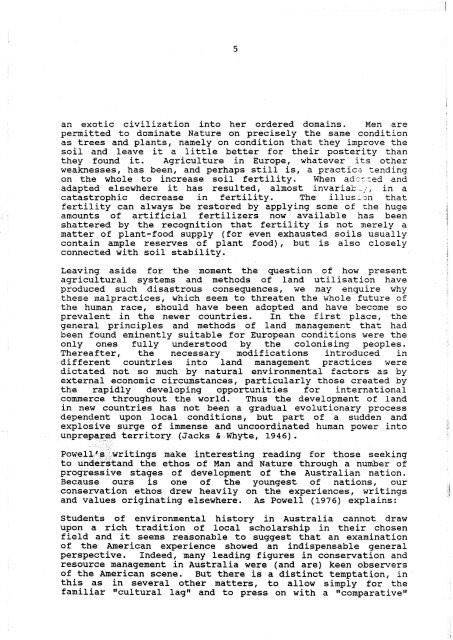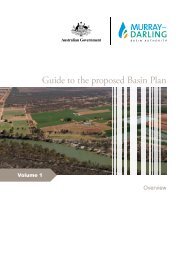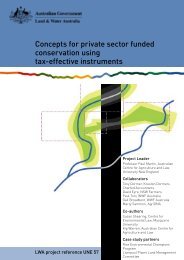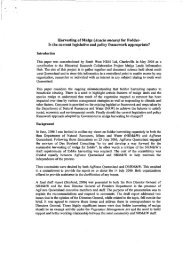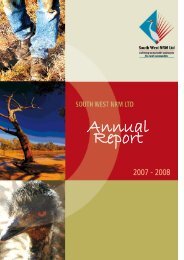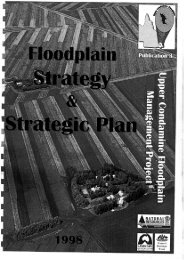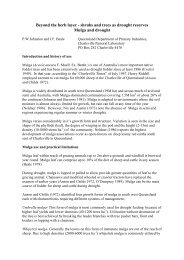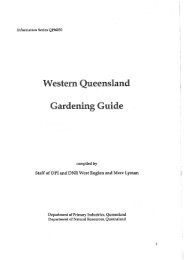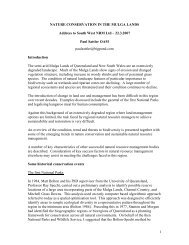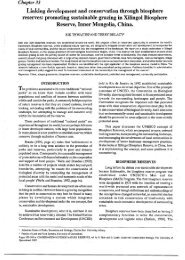soil-conservation-people-religion-and-land.pdf - South West NRM
soil-conservation-people-religion-and-land.pdf - South West NRM
soil-conservation-people-religion-and-land.pdf - South West NRM
Create successful ePaper yourself
Turn your PDF publications into a flip-book with our unique Google optimized e-Paper software.
an exotic civilization into her ordered domains. Men are<br />
permitted to dominate Nature on precisely the same condition<br />
as trees <strong>and</strong> plants, namely on condition that they improve the<br />
<strong>soil</strong> <strong>and</strong> leave it a little better for their posterity than<br />
they found it. Agriculture in Europe, whatever its other<br />
weaknesses, has been, <strong>and</strong> perhaps still is, a practicz tending<br />
on the whole to increase <strong>soil</strong> fertility. When ad(:r.zed <strong>and</strong><br />
adapted elsewhere it has resulted, almost invariak .I-, in a<br />
catastrophic decrease in fertility. The illus-~n that<br />
fertility can always be restored by applying some of the huge<br />
amounts of artificial fertilizers now available has been<br />
shattered by the recognition that fertility is not merely a<br />
matter of plant-food supply (for even exhausted <strong>soil</strong>s usually<br />
contain ample reserves of plant food), but is also closely<br />
connected with <strong>soil</strong> stability.<br />
Leaving aside for the moment the question of how present<br />
agricultural systems <strong>and</strong> methods of l<strong>and</strong> utilisation have<br />
produced such disastrous consequences, we may enquire why<br />
these malpractices, which seem to threaten the whole future of<br />
the human race, should have been adopted <strong>and</strong> have become so<br />
prevalent in the newer countries. In the first place, the<br />
general principles <strong>and</strong> methods of l<strong>and</strong> management that had<br />
been found eminently suitable for European conditions were the<br />
only ones fully understood by the colonising <strong>people</strong>s.<br />
Thereafter, the necessary modifications introduced in<br />
different countries into l<strong>and</strong> management practices were<br />
dictated not so much by natural environmental factors as by<br />
external economic circumstances, particularly those created by<br />
the rapidly developing opportunities for international<br />
commerce throughout the world. Thus the development of l<strong>and</strong><br />
in new countries has not been a gradual evolutionary process<br />
dependent upon local conditions, but part of a sudden <strong>and</strong><br />
explosive surge of immense <strong>and</strong> uncoordinated human power into<br />
unprepared territory (Jacks & Whyte, 1946).<br />
Powell~s~writings make interesting reading for those seeking<br />
to underst<strong>and</strong> the ethos of Man <strong>and</strong> Nature through a number of<br />
progressive stages of development of the Australian nation.<br />
Because ours is one of the youngest of nations, our<br />
<strong>conservation</strong> ethos drew heavily on the experiences, writings<br />
<strong>and</strong> values originating elsewhere. As Powell (1976) explains:<br />
Students of environmental history in ~ustralia cannot draw<br />
upon a rich tradition of local scholarship in their chosen<br />
field <strong>and</strong> it seems reasonable to suggest that an examination<br />
of the American experience showed an indispensable general<br />
perspective. Indeed, many leading figures in <strong>conservation</strong> <strong>and</strong><br />
resource management in Australia were (<strong>and</strong> are) keen observers<br />
of the American scene. But there is a distinct temptation, in<br />
this as in several other matters, to allow simply for the<br />
familiar I1cultural lag" <strong>and</strong> to press on with a lfcomparativell


